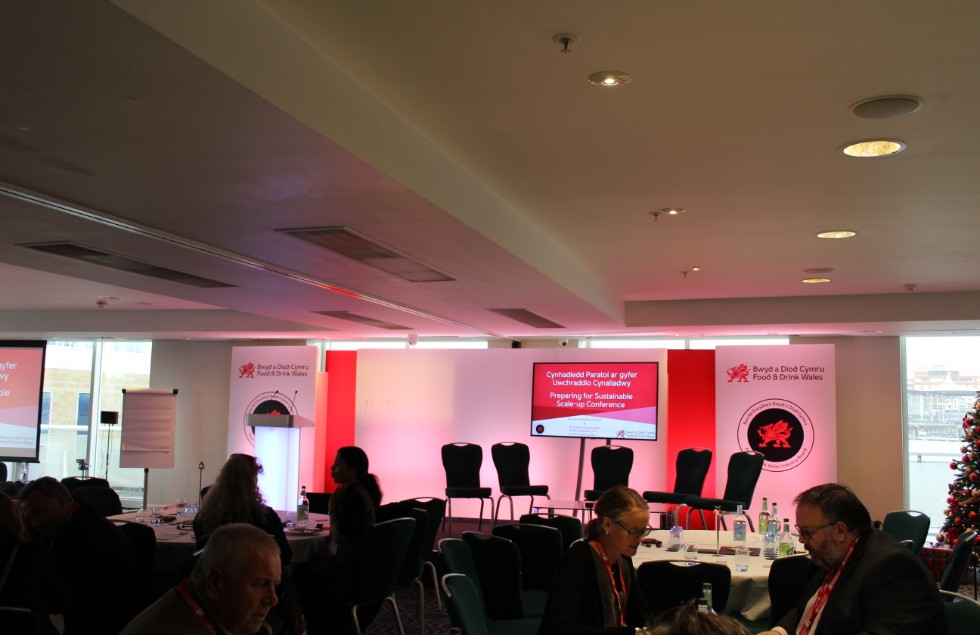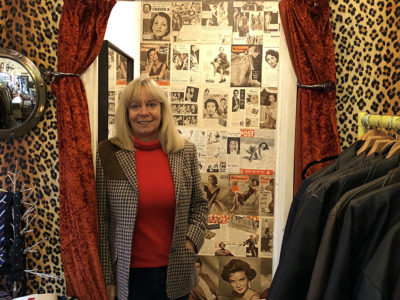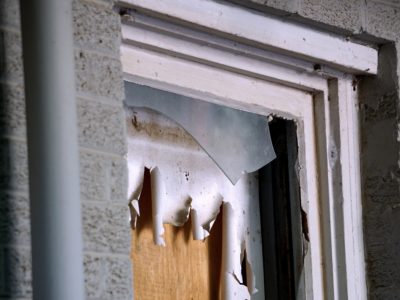Two experts on scaling up environmentally sustainable food and drink businesses
Deri Reed, The Warren
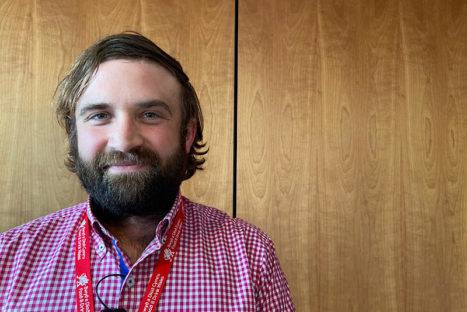
Deri was part of the panel for a workshop at the event called exploring investment opportunities for businesses with high social value
Deri is the owner and chef of The Warren in Carmarthen, a family-run, sustainably-driven Café, Restaurant and Bar.
Why is sustainability so important to you?
Because I do believe in what Greta Thunberg is saying that the world is on fire, I have quite a large voice and I have the possibility to change the way people buy and the way that people eat and it’s really important that I do that because I care about the earth I am living on, it’s my home.
Would you say that being sustainable ever limits your growth potential?
No, because that’s more my target, that’s what makes me grow even more because I know it is a difficult field and it’s a lot more challenging. Things cost more to be sustainable, paying your staff more than the UK minimum wage and spending double the amount on your ingredients while also trying to keep the cost down of your food. This, however, is what fuels me to keep going, my life has been moulded around my job.
Would you ever sacrifice sustainability for profit?
I would never sacrifice it for profit, it’s always been people and the planet before profit and it will continue to be that. That’s not to say that we are 100% sustainable, there are still many areas that could be a lot better, but that’s not down to the fact that I want my profit level to be larger, it’s down to the fact that if everything is 100% sustainable, it doesn’t turn into a business; it turns into something that has to be funded to keep on going and that isn’t a model that we are running at the moment.
Maciek Kacprzyk, Flawsome Drinks
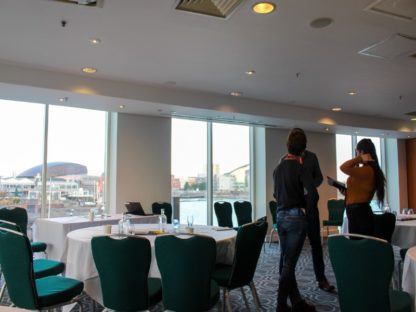
Talking to Maciek at the event workshop.
Maciek is the CEO and co-founder of Flawsome Drinks, a company that saves imperfect fruit and vegetables from being wasted and transforms them into perfectly-crafted cold-pressed juice.
Why is sustainability so important to you?
Sustainability is the future, we live in a world where there is so much pollution, there is so much waste, so much poverty and hunger so for me, sustainability is working towards a future that is better and more sustainable – so this is what we do at Flawsome, we want to tick as many boxes as possible and help as many people as possible.
Would you say that being sustainable ever limits your growth potential?
Yes, quite significantly actually because for example, we have been working on this project for 23 months, but if we were to do everything in an unsustainable way we could have done it all in three to six months. But because we wanted to keep our values undiluted it took us much longer. Commercially, acting unsustainably is better, but better in the short-term. In the long-term, I believe it’s better to do things nicely in an ethical way. And also, if you do things in an ethical way, in the Flawsome way, then you will stand out more and people will look out for you.
Would you ever sacrifice sustainability for profit?
Again no, because sacrificing sustainability would only be good in the short-term and we work in the long-term, we work for our children and the children of our children.
The Food and Drink Wales Industry Board have put on the first sustainable scale-up conference to encourage more growth
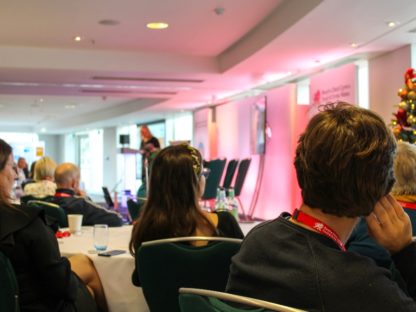
The first sustainable scale-up conference was organised by the Food and Drink Wales Industry Board to assist businesses in the food and drink sector plan and successfully execute their growth journey.
The event, held at the Saint David’s Hotel in Cardiff Bay, brought together productivity experts, investors and advisors to inform food and drink businesses on how they can sustainably develop operations, products and profit through talks, panel discussions and one-on-one workshops.
In 2014, the Welsh Government established a food and drink action plan with the aim to grow the sector by 30% before 2020. While they are currently on track to meet this goal, conferences like Sustainable Scale-Up are being organised for the benefit of the food and drink industry, ensuring that the government exceeds this growth goal.
The food and drink industry is a key player in the economy of Wales, employing more than 240,000 people with an annual turnover of £20.5bn in 2018.
Andy Richardson, chairman of the Food and Drink Wales Industry Board, said in his opening speech, “I am passionate about the food and drink sector in Wales.
“I do believe that businesses who invest in innovation, people and capability will be the ones that succeed in the future.”
He continued, stating that the purpose of Sustainable Scale-Up 2019 was for food and drink businesses to leave feeling inspired with the tools, insight and connections to successfully invest in their growth.
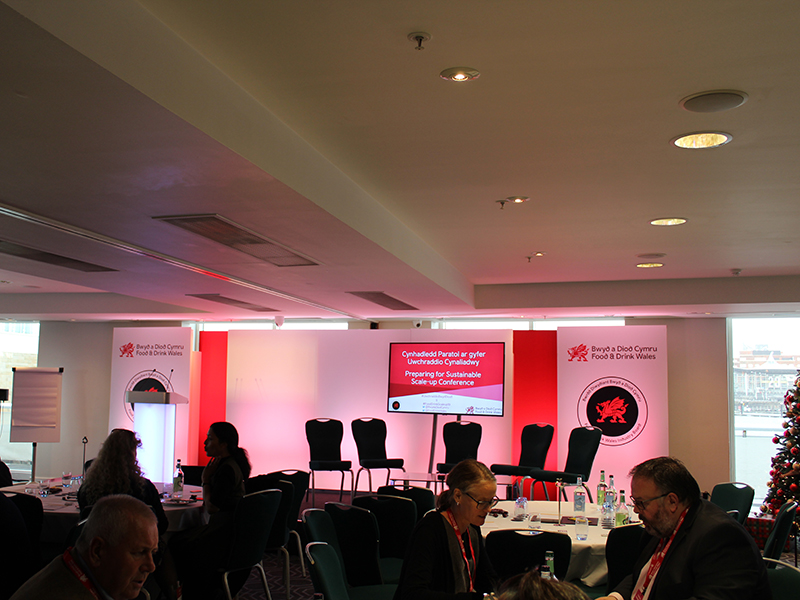
The day-long conference also highlighted the success of Investor Ready, a programme that aims to help food and drink businesses prepare for commercial investment and achieve their growth ambitions. This was started two years ago as a result of the Food and Drink Wales Industry Board realising that finance and growth needed more attention within the sector, particularly for smaller independent food and drink businesses.
alt.cardiff are at the Sustainable Scale-Up Conference today, the first in Wales for the food and drink sector. @FoodDrinkWales #sustainability #cardiffevents pic.twitter.com/aQ4Wm6yaFt
— alt cardiff (@alt_cardiff) November 26, 2019
The first panel of the day talks about how to help food and drink businesses prepare for investment. Very excited to hear from Asher Flowers of Rogue Preserves and Abigail Dymmock @jackandamelie @FoodDrinkWales #FoodDrinkScaleup19 pic.twitter.com/rstT4EW2HI
— alt cardiff (@alt_cardiff) November 26, 2019
Great to see so many businesses and investors at #FoodDrinkScaleup19 hosted by @FoodDrinkWales and @bicinnovation pic.twitter.com/JjzN8ThbpO
— alt cardiff (@alt_cardiff) November 26, 2019
Alun Lewis, head of Investor Ready, said the programme was prepared to help and listen to businesses of any size.
“We are people that have been in the industry; been there, done that and got several t-shirts,” he joked. “We are here to help anyone, from small businesses to large businesses.”
He also explained that there isn’t a definitive answer to what the right speed is for food and drink businesses to scale up as all are different.
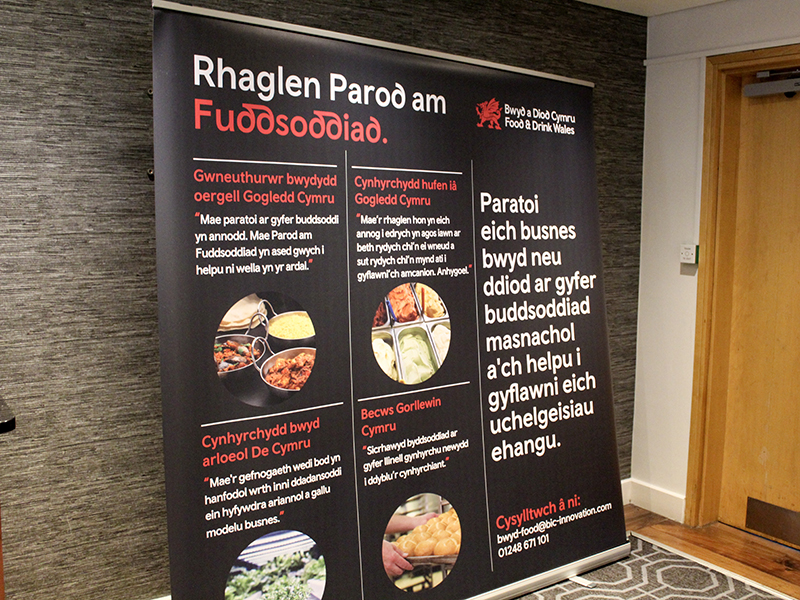
Maxine Adams, head of business growth for Innovate UK, said, “This conference is a testament to the potential that Wales offers.
“Our job isn’t to provide the passion because you have it in spades,” she said, addressing the food and drink business owners present. “Our job is to offer the infrastructure and advice to grow.”
For food and drink businesses based in Wales, the Sustainable Scale-Up Conference proved that there are opportunities to grow regardless of size; it’s about careful planning and learning what tools and resources are available in the industry.
Andy Richardson finished the conference by saying that steady growth in the food and drink sector in Wales was far better than exponential industry growth that then crashes.
“I think we have to grow as a food and drink sector. It’s about understanding what [food and drink] businesses have to do to grow in a way that won’t compromise their future ability to do so,” he said. “I want people to understand how to go about it; what the baby steps are to do that.”
Words: Sorcha Hornett, Chelsea Davies, Andrea Gaini and Maude Agombar.
Two experts on scaling up environmentally sustainable food and drink businesses
Deri Reed, The Warren

Deri was part of the panel for a workshop at the event called exploring investment opportunities for businesses with high social value
Deri is the owner and chef of The Warren in Carmarthen, a family-run, sustainably-driven Café, Restaurant and Bar.
Why is sustainability so important to you?
Because I do believe in what Greta Thunberg is saying that the world is on fire, I have quite a large voice and I have the possibility to change the way people buy and the way that people eat and it’s really important that I do that because I care about the earth I am living on, it’s my home.
Would you say that being sustainable ever limits your growth potential?
No, because that’s more my target, that’s what makes me grow even more because I know it is a difficult field and it’s a lot more challenging. Things cost more to be sustainable, paying your staff more than the UK minimum wage and spending double the amount on your ingredients while also trying to keep the cost down of your food. This, however, is what fuels me to keep going, my life has been moulded around my job.
Would you ever sacrifice sustainability for profit?
I would never sacrifice it for profit, it’s always been people and the planet before profit and it will continue to be that. That’s not to say that we are 100% sustainable, there are still many areas that could be a lot better, but that’s not down to the fact that I want my profit level to be larger, it’s down to the fact that if everything is 100% sustainable, it doesn’t turn into a business; it turns into something that has to be funded to keep on going and that isn’t a model that we are running at the moment.
Maciek Kacprzyk, Flawsome Drinks

Talking to Maciek at the event workshop.
Maciek is the CEO and co-founder of Flawsome Drinks, a company that saves imperfect fruit and vegetables from being wasted and transforms them into perfectly-crafted cold-pressed juice.
Why is sustainability so important to you?
Sustainability is the future, we live in a world where there is so much pollution, there is so much waste, so much poverty and hunger so for me, sustainability is working towards a future that is better and more sustainable – so this is what we do at Flawsome, we want to tick as many boxes as possible and help as many people as possible.
Would you say that being sustainable ever limits your growth potential?
Yes, quite significantly actually because for example, we have been working on this project for 23 months, but if we were to do everything in an unsustainable way we could have done it all in three to six months. But because we wanted to keep our values undiluted it took us much longer. Commercially, acting unsustainably is better, but better in the short-term. In the long-term, I believe it’s better to do things nicely in an ethical way. And also, if you do things in an ethical way, in the Flawsome way, then you will stand out more and people will look out for you.
Would you ever sacrifice sustainability for profit?
Again no, because sacrificing sustainability would only be good in the short-term and we work in the long-term, we work for our children and the children of our children.

